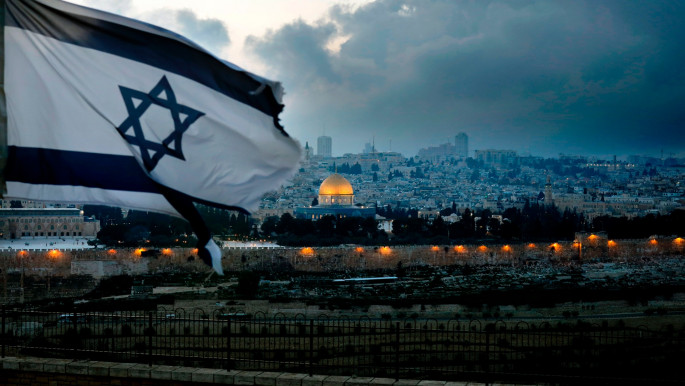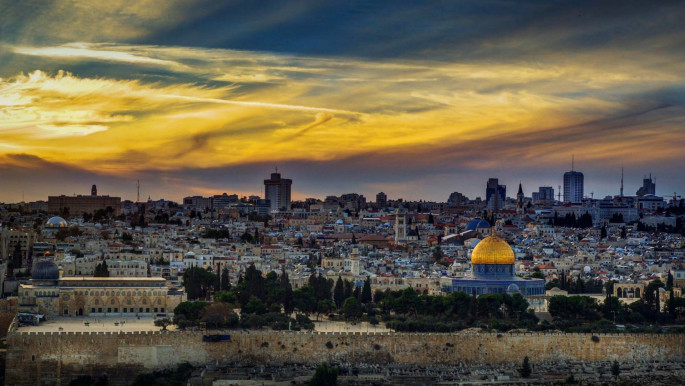Palestine's olive harvest marred by rising Israeli settler violence
The annual olive harvest in the West Bank kicked off at the beginning of this month with the usual hardships brought about by the Israeli occupation and its many policies to impede Palestinian farmers from reaching their lands.
Dozens of Palestinians have also been attacked, while hundreds of their crops and olive trees have been destroyed by radical Israeli settlers across the occupied West Bank, especially in the areas of Ramallah, Nablus, Bethlehem and Salfit.
The Israeli human rights group, B'Tselem, has so far documented at least 29 incidents linked to the olive harvest season, notably in the northern West Bank, 21 of which were perpetrated by settlers and three by Israeli armed forces.
The violations consisted of physical assaults, theft of olives, burning, cutting or uprooting of trees, as well as restrictions on land access.
Acts of vandalism and violence against Palestinian-owned olive orchards have also occurred this year long before the olive picking season began. In mid-September a group of settlers accompanied by bulldozers stormed Bedia village, west of Salfit, razing 16 dunams of fruit orchards and uprooting 950 trees. Settlers from the Rahlim outpost southeast of Nablus also uprooted at least 100 olive trees, each was 50 years old.
 |
Olive crops incur heavy losses every year due to repeated acts of sabotage by settlers and movement restrictions imposed by the Israeli army |  |
Zaid, 55, from Burin village, had more than 400 olive trees set on fire by settlers from Givat Rounim settlement in June. He then tried to plant new olive trees but both the Israeli army and settlers prevented him from doing so.
"The olives trees were planted by my father and grandfather. Burning my trees is an
attempt to forcibly displace me from my land and take over it," he told members of Palestinian grassroots campaign Stop the Wall.
 |
|
| Read more: The day after annexation: Israel, Palestine and the one-state reality |
The 55-year-old, who is now harvesting from his ten olive trees left, is still suffering regular attacks by settlers under the protection of Israeli soldiers. Recently, they destroyed his harvesting tools and hurled stones at him and his three children.
Zaid's account is a common story for Palestinian farmers who endure daily violations at the hands of Israeli security forces and settlers, who destroy olive trees in an attempt to undermine the Palestinian economy and coerce Palestinians into giving up their farmland for the expansion of illegal settlements.
Marked in October every year, the olive harvest constitutes a critical source of livelihood for thousands of Palestinian families. With more than 12 million olive trees planted across nearly half of the West Bank's agricultural land, olive oil is not only central to Palestinian food security but is also a large part of their export economy.
Besides its economic significance, the olive picking is a joyful and festive time of the year, a "national wedding", as Palestinians call it, when extended family members, friends and neighbours come together and help each other in picking olives.
 |
Settler violence is fully backed by the Israeli state, with soldiers doing nothing as these attacks are carried out, and often participating themselves |  |
Furthermore, olive trees are symbolic of the Palestinian attachment to their land. Drought-resistant, growing under poor soil conditions, and living and bearing fruit for thousands of years, the trees represent Palestinian resistance and resilience in the face of the Israeli occupation.
Um Mazen from Awarta town, near Nablus, insists every year on harvesting the olive trees that she planted decades ago despite the danger posed by the settlers' presence. "I planted those trees myself…they are worth the world for me", she said last month.
Because of the repeated acts of sabotage in Palestinian olive groves by settlers and the movement restrictions imposed by the Israeli army, olive crops incur heavy losses every year, with the annual celebratory occasion habitually marred by violence.
But Palestinians also face routine restrictions in accessing their land for most of the year. On 17 September, for example, the Israeli army issued 63 military orders to bar access to around 3,000 dunums (three square kilometres) of agricultural land planted with olive trees in Hebron, Bethlehem, Ramallah and Nablus. The orders indicated that the fields were considered part of nearby illegal settlements.
 |
|
| Read more: US election 2020: What's at stake for Palestine? |
B'Tselem spokesperson Amit Gilutz pointed out that Palestinians are barred from reaching much of their farmlands that are located near Israeli settlements "all year around", except with prior Israeli coordination and permits that are usually granted only for a few days of the year, including during the harvest.
As such, military orders are said to pave the way for Israeli settlers to invade Palestinian olive fields, steal the fruits and cut down the trees, besides burning and damaging the land under the protection of Israeli soldiers.
"Settler violence is fully backed by the Israeli state, with soldiers doing nothing as these attacks are carried out, and often participating themselves in the attacks", Gilutz told The New Arab. "Then it continues with the complete lack of accountability".
Such violence, he emphasised, serves the interests of Israel in that it operates at the forefront of the advancing a process of "stripping the Palestinians of their resources and transferring them to the hands of the Israelis".
 |
This year's olive harvest is experiencing a particularly aggressive campaign as settlers and the Israeli army are using coronavirus lockdown measures to further push land theft |  |
This year, the Israeli army has mostly denied permits for Palestinians to enter their lands next to settlements, according to Manal Shqair, advocacy and campaigning coordinator of Stop the Wall.
Palestinian land owners who try to reach the fields despite these restrictions expose themselves to all forms of abuse by settlers. Those who suffer the most violence are Palestinians living in close proximity to settlements.
About a week ago, Shqair accompanied a farmer to pick olives on his land in Yanoun, near Nablus, which is surrounded by three major settlements. She was told by the man how settler assaults had recently increased, citing one incident in which, days before, "armed colonists" had come to his house and "threatened to gun him down".
Stop the Wall's advocacy officer also reported a new "policy" being adopted by settlers in the Yanoun area involving sending women to graze cattle on the farmer's land. "If a Palestinian man tried to approach and chase her, then the Israeli settlers would accuse him of sexually harassing her," she said.
Twitter Post
|
Yanoun villagers were forcibly removed from their homes in 2002 after violent attacks by Israeli settlers. Many of the residents have now returned, accompanied by members of international peace organisations, who have since provided a protective presence in the village facing systematic settler aggression.
This year's olive harvest is experiencing a particularly aggressive campaign as, Palestinians say, settlers and the Israeli army are using coronavirus lockdown measures to further push land theft and sabotage.
One related problem is that Covid-19 travel restrictions have hindered the mobility of solidarity groups and activists and their ability to escort Palestinian farmers. With little international presence to monitor and document events on the ground, more incidents of settler violence are likely to occur undeterred.
This is all taking place amidst accelerated settlement activities, with full backing from the Trump administration.
B'Tselem spokesman Amit Gilutz argues that Israel has been rather successful at conducting its operation of ongoing oppression by moving very carefully and slowly. "By denying Palestinians their rights, making their lives miserable every day, Israel has succeeded in controlling five million people generation after generation while avoiding too much international attention," he stressed.
Despite the aggression of settlers and Israeli soldiers, Stop the Wall has been running the 'You Are not Alone' campaign for 17 years to support Palestinian farmers during the olive harvest season, particularly in hard-to-reach areas that are at risk of confiscation for settlement expansion like Izbet Shufa, in Tulkarem, Deir Istya, in Salfit, and Yanoun.
Campaign volunteers helped Saleem and his family in Yanoun to pick olive tree two weeks ago. "The Israeli settlers living in the neighbouring settlement of Itamar, constantly attack us while harvesting our olive trees. Armed settlers attack my house and farm regularly. Through the support of the volunteers, we will be able to finish picking our olive trees faster before the settlers destroy them," Saleem told campaign members.
Palestinian and Israeli activists and groups, among them the Palestinian Faz3a campaign and Rabbis for Human Rights (RHR), are taking part in voluntary activities to accompany farmers harvesting olive trees and protect them from settler attacks.
In a statement, the World Council of Churches (WCC) launched a global initiative to express solidarity and raise public awareness about constant threats, harassment, and the vandalisation of Palestinian lands and property.
Alessandra Bajec is a freelance journalist currently based in Tunis.
Follow her on Twitter: @AlessandraBajec




 Follow the Middle East's top stories in English at The New Arab on Google News
Follow the Middle East's top stories in English at The New Arab on Google News


